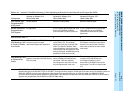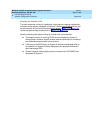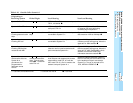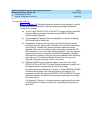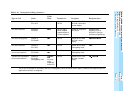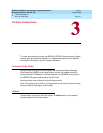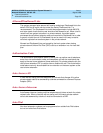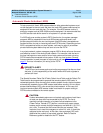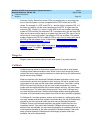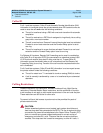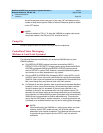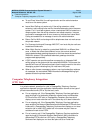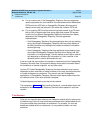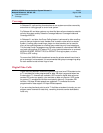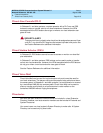
MERLIN LEGEND Communications System Release 6.1
Network Reference
555-661-150
Issue 1
August 1998
Feature Interactions
Page 3-3Automatic Route Selection (ARS)
3
Automatic Route Selection (ARS) 3
To help prevent toll fraud, ARS access codes for other networked systems must
not be assigned to the non-local dial plan; the local ARS access code cannot be
assigned to the non-local dial plan. For example, if the ARS access code is 9,
extension ranges such as 9000–9039 cannot be assigned. It is recommended that
the ARS access code be the same for all systems in a private network.
For ARS calls over another system’s PSTN lines/trunks, the system manager
programs ARS to prepend the non-local ARS access code and send it over
private network trunks to the non-local system (the ARS code is accepted over
tandem facilities, but not on incoming calls over PSTN trunks). Depending on how
ARS is programmed at the non-local system, calls may be sent to yet another
private network system before they are sent out over the PSTN.
In a private network, system managers program ARS to direct calls over the most
cost-effective routes in the whole private network. For example, calls that are in
the local calling area or area code of a non-local system can be sent out using
PSTN lines/trunks connected to that system. At the non-local system, Remote
Access operation is used to accept or reject such a call (see “Remote Access” on
page 21 for more information) for routing to the PSTN.
SECURITYlALERT:
!
The ARS non-local access code must not be programmed into the non-local
dial plan. It is the responsibility of the switch where ARS calls originate to
prevent toll fraud.
The Special Numbers Table, Dial 0 Table, Default Local Table, and the Default Toll
Table need to be programmed to prepend the remote system’s ARS code. In
networked systems, when the main pool contains tandem trunks, the local system
automatically prepends its own ARS access code before sending 101xxxx equal-
access Interexchange (IXC) calls across the private network. In this case, the
local and remote system ARS access codes
must
match for proper routing to
PSTN trunks connected to the remote system.
CAUTION:
!
Unless networked systems are co-located, each system should have
at least one loop-start line connected to the PSTN. The line is
required to allow connection of a power-failure telephone to the
Power-Failure Transfer (PFT) jack on a module as a power outage
backup and for correct routing of emergency and other N11 (911, 411,
etc.) calls. To ensure that the correct services are reached, if the
loop-start line is used for emergency or other N11 calls, it should be
assigned to the main pool. In this case, inter-exchange (IXC) calls
determine the number of loop-starts required. Refer to
Feature
Reference
guide for details on the PFT feature.



